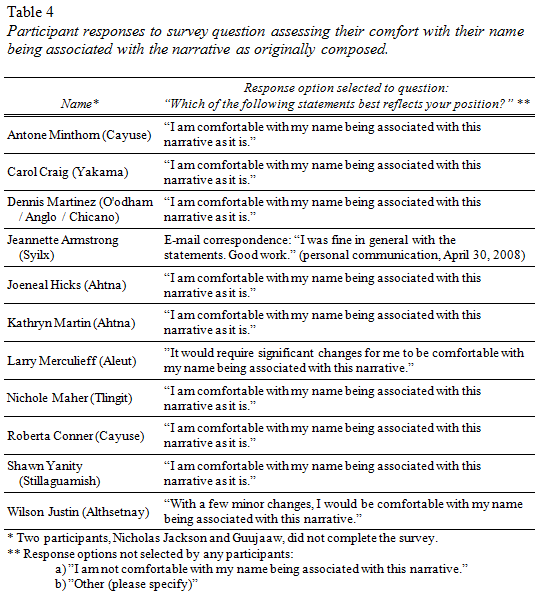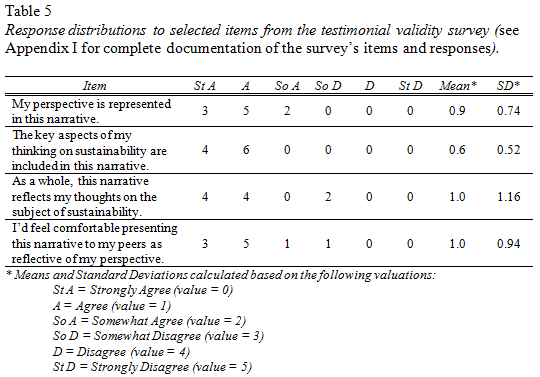|
Testimonial Validity Survey Results
Participants were provided with copies of the narrative results and invited to
complete an on-line survey to facilitate their feedback and provide assessment of testimonial validity,
the degree to which the narrative was viewed as an accurate representation of their respective
perspectives on sustainability (Stiles, 1993). Ten of the thirteen participants responded to the
survey (see Appendix I) for complete response data). An eleventh participants offered e-mail
correspondence and indicated general satisfaction with the narrative. Feedback via the survey was
largely positive, with minor issues identified by several participants and major issues identified
by one participant (e.g., see Table 4). Questions about how well the narrative included a given
participant's perspective and how well the overall narrative represented their perspective in general
were scored from 0.0 to 5.0, with 0.0 corresponding to "strongly agree" and 5.0 corresponding to
"strongly disagree." Mean scores ranged from 0.6 to 1.0, and standard deviations ranged from 0.52
to 1.12, indicating an overall solid level of agreement with the content of the narrative with some
variability among the participants (see Table 5). Additional open-ended questions were posed to ensure
accuracy in representation and to further gauge participant reaction. Appendix I provides full
documentation of all responses to the testimonial validity survey.


Greatest reservation about the narrative was expressed by Larry Merculieff (Aleut).
A phone conversation and a series of e-mail exchanges were engaged to better understand the issues of
concern for acknowledgement here. Appendix J offers correspondence shared by Merculieff regarding his
primary concerns with the format of the narrative. Merculieff found the "we" narrative voice problematic
due to its implication of grouping all participants in consensus around the statements. Concern was
also expressed about taking information and quotes out of the full context that they were originally
shared. This was cited as a recurrent problem in the attempts to "incorporate" traditional ways of
knowing into Western science (L. Merculieff, personal communication, April 13, 2008). Merculieff also
identified use of some problematic language. The handling of these issues and others raised are addressed
below.
Based upon all the feedback received, and after consulting with members of the project's
research council, several changes were made to the final narrative, and several elements left the same.
These are as follows:
- In response to Merculieff's expressed preference to not have his name associated with the narrative
content, all citations linking narrative statements to his interview content were removed. Two direct
quotes of his were removed and replaced with paraphrased versions. Replacing with paraphrased content
was essential to maintain the completeness of the narrative as reviewed and supported by the other
participants. The two paraphrased sentences are: "In our worldview, everything is profoundly connected,"
and, "We must embody our awareness of the intimate and profound connection among all things. We possess
an inherent intelligence, and if we operate with our minds and our hearts connected, then we will move in
greater harmony with creation."
- All occurrences of the phrase "natural resources" were replaced due to expressed concerns that it was
Western terminology and predisposes fish, wildlife and habitats to be viewed as commodities.
- Under the section, "A Human Focus," the occurrences of the phrases "people centered" and "human centered"
were replaced with the phrase "a human focus." Concern was expressed that "human centered" implied that
humans are more important than the Earth. Such an implication would be inconsistent with other themes of
the narrative. The phrase "a human focus" was also deemed to be more consistent with the content of the
original interviews. An additional modification to sentence order was made to give greater clarity to the
intended meaning of the section that more focus needs to be given towards understanding our nature as human
beings and towards structuring human systems to be in greater alignment with the natural world.
- The narrative's concluding statement initially read: "Gifted with this potential, our purpose is to
continuously maintain ourselves and all our relations in harmony and balance with natural law. The extent
to which our cultures serve this purpose is the extent to which they are ultimately valid and worthy of being
passed along to future generations." The words "valid and" were removed due to concerns expressed about
"valid" being a loaded term. Beyond loaded meaning, there was concern that with use of the word "valid,"
particular aspects of a culture that do not directly serve the stated purpose could be deemed as invalid.
It was decided that the intended meaning of the statement was retained without the term.
- The first person plural ("we") voice was retained due to the support expressed by the vast majority of
the participants, including direct statements of appreciation for use of the collective voice. The
practicalities of restructuring were also a significant deterrent. I also personally believe that the
accessibility, readability, and overall appeal of the content are enhanced by the narrative in its current
form (see Appendix J for critique of this representation decision).
- Regarding the concern about quoting out of context, this is acknowledged as an inherent limitation of
any exercise that necessitates reduction of information. As noted in the opening to the results section,
readers are directed to the project website (see Appendix K) for complete interview transcripts. Beyond
this, the testimonial validity survey was designed to reduce the problem by giving participants the
opportunity to identify misrepresentations of any of their statements or perspectives. No specific statements
were cited as being misrepresentative. The general concern led to the removal of two direct quotes as detailed
above.
- A comment that the narrative lacks coverage of leadership as a key element in sustainability prompted
consideration of the topic's inclusion. Leadership was raised as a topic under "Our Vision" and
"How We Get There," but not directly under "'Sustainability:' The word and concept." Reviewing original
content from the interviews, it was concluded that leadership was covered consistent with the manner in
which it was spoken to by the participants as a whole預t least as interpreted by the researcher. Justin,
who made the comment, did speak at greater length about leadership than many other participants. Indeed,
his perspective was highly influential in prompting as much coverage of leadership as is found in the narrative.
The reader is encouraged to see the full interview of Justin for more depth on the topic of leadership.
- "Recognizing God for giving us this gift," was shared as a comment related to the survey's question
about level of agreement with the concluding statement of the narrative. The comment is acknowledged as
legitimate, but it was not added as it would significantly alter the concluding statement as evaluated by
other participants. Also, recognition of the Creator as the source of gifts appears several other times
throughout the narrative.
- Despite the suggestion for removal, use of the term "sustainability" was retained throughout to fulfill
a key aspect of the project's intention to explore the conceptual meaning of "sustainability."
The testimonial validity process in general helped to verify and refine the accuracy of
my representation of the perspectives shared. The updated narrative summary follows.
Introduction to Results and Narrative Summary
Narrative Summary
|

